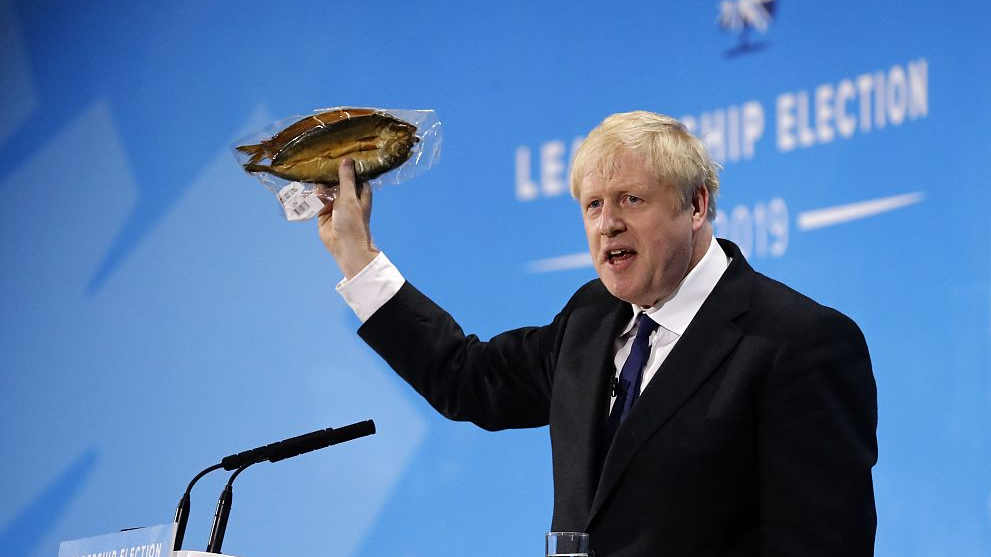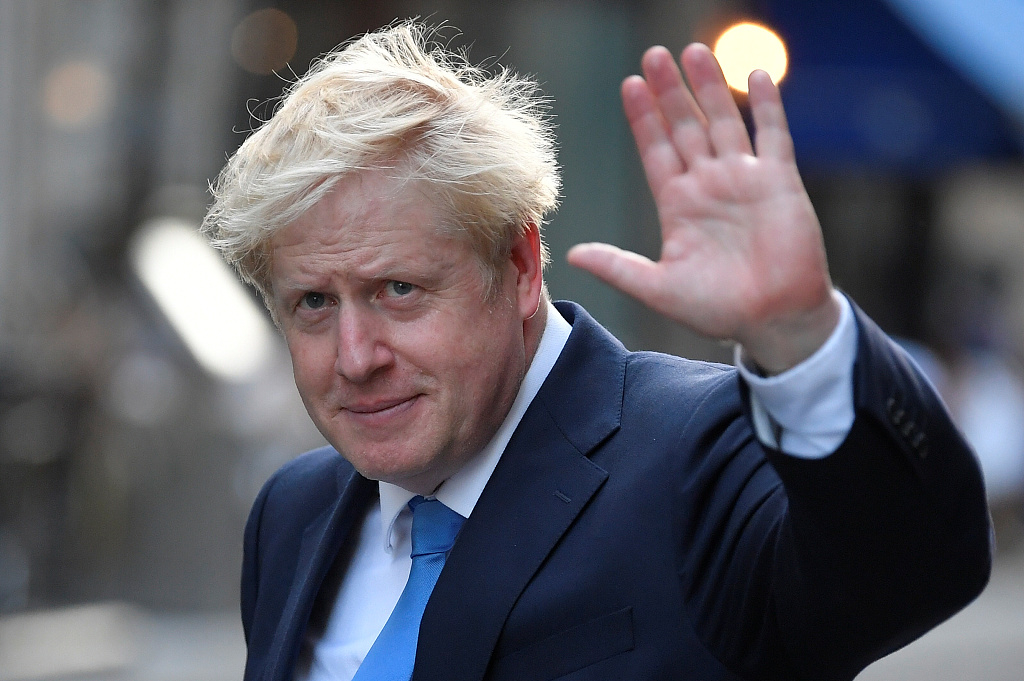

Editor's Note: Chris Deacon is a postgraduate researcher in politics and international relations at the University of London and previously worked as an international commercial lawyer. The article reflects the author's opinions and not necessarily the views of CGTN.
Having won the UK Conservative Party's leadership contest on July 23, Boris Johnson will become Prime Minister when Theresa May resigns on July 24. However, he begins his premiership with a razor-thin majority in the UK Parliament, which might be about to get even smaller. Can he last more than a few months?
The shortest-serving prime minister in British history up to this point is George Canning. He was prime minister in 1827 for all of 119 days. Canning had to stand down from his role due to health issues, having suffered a stroke only months into his premiership. He died the following year.
Replacing Canning as Britain's shortest-serving prime minister is certainly a record that Boris Johnson does not wish to set, but it appears eminently possible that this fate could befall him given the current circumstances of British politics and numbers in the House of Commons.
The governing Conservatives, on their own, do not even possess a majority. Instead, they rule in a "confidence and supply" arrangement with the Northern Irish Democratic Unionist Party (DUP).
This arrangement is not permanent and falls short of a full coalition. The DUP, however, are likely to back Johnson for the time being, at least, given their support of Brexit.
Even with the DUP, the government currently only enjoys an extremely thin majority in the House of Commons. If, as expected, the Tories lose the by-election due to occur in Brecon and Radnorshire next week, this majority will be cut to only three.

Newly elected British Prime Minister Boris Johnson speaks during the Conservative Leadership announcement at the QEII Centre in London, England, July 23, 2019. /VCG Photo
Worse still, Conservative MP Charlie Elphicke has recently been charged with sexual assault offenses by police and could be forced out of Parliament. If so, this would trigger a further by-election, which would cut the majority to just one MP. This is about as insecure an opening that Johnson could imagine for his premiership.
Such a situation would mean that it would take only a single MP out of all Conservative and DUP MPs to rebel against the government for it to lose a vote. This makes everyday government business incredibly difficult. Even the most mundane and uncontentious legislation could become extremely difficult to navigate through Parliament.
Currently, in British politics, the emphasis is on legislation concerning a topic which is the very opposite of mundane and uncontentious – the UK's withdrawal from the European Union.
Indeed, Brexit may be the quickest route to a rapid end to Johnson's premiership if he seeks to pursue a no-deal Brexit as promised if he cannot extract the concessions from Brussels that he desires.
Plenty of Conservative MPs have already promised to do whatever it takes to stop this eventuality from happening. For some, this includes going as far as bringing down their own government in a vote of no confidence.
This would be a severe step for any Conservative MP given the possibility that it could usher in a Labour government under Jeremy Corbyn – something that all Tories fear greatly.
If a general election were to be triggered in such circumstances, the Conservatives – with Johnson as their leader – would likely be in serious trouble. This is especially the case if the election occurs before Brexit is delivered, as the Tories would almost certainly lose a very significant chunk of their vote to the Brexit Party as they did in the European elections earlier this year.

Boris Johnson, leader of Britain's Conservative Party, leaves a private reception in central London, Britain, July 23, 2019. /VCG Photo
In the face of such a defect, Johnson would likely be forced to resign as leader of his party. Even if he somehow stayed on, he would have given up the keys to 10 Downing Street.
In the early weeks of Johnson's premiership, therefore, every vote will matter. It will be inordinately easy for opposition parties to inflict defeats on the government, and, if these mount up, it will be doubtful as to whether the government can continue without a general election.
But the pursuit of a no-deal Brexit will be where Johnson really comes unstuck. His Tory colleagues are unlikely to be complicit in bringing down their own government over other issues. Even if they rebel occasionally, they will likely back Johnson in a confidence motion.
But if he attempts to leave the EU without a deal, there are plenty who will choose triggering a general election as the lesser of two evils. If Johnson truly walks this path, he could be out of Downing Street within months at the hands of his own MPs.
(If you want to contribute and have specific expertise, please contact us at opinions@cgtn.com.)

Copyright © 2018 CGTN. Beijing ICP prepared NO.16065310-3
Copyright © 2018 CGTN. Beijing ICP prepared NO.16065310-3